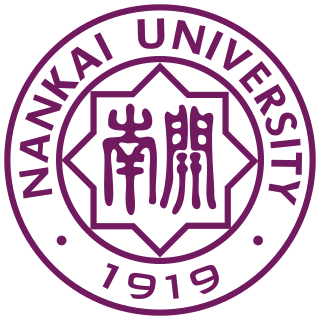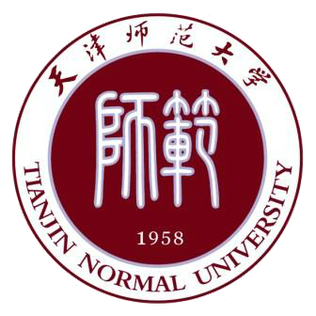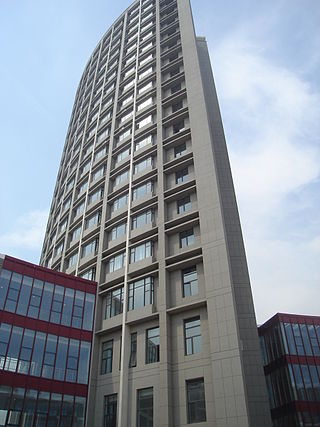Related Research Articles

Tianjin, alternately romanized as Tientsin, is a municipality and a coastal metropolis in Northern China on the shore of the Bohai Sea. As such, it is not part of a province of China. It is one of the nine national central cities in Mainland China, with a total population of 13,866,009 inhabitants during the 2020 Chinese census. Its built-up area, made up of 12 central districts, was home to 11,165,706 inhabitants and is also the world's 29th-largest agglomeration and 11th-most populous city proper.

The National University of Singapore (NUS) is a national public collegiate and research university in Singapore. Founded in 1905 as the Straits Settlements and Federated Malay States Government Medical School, NUS is the oldest autonomous university in Singapore. It offers degree programmes in disciplines at both the undergraduate and postgraduate levels, including in the sciences, medicine and dentistry, design and environment, law, arts and social sciences, engineering, business, computing, and music.

Nankai University is a national public university located in Tianjin, China. Established in 1919 as the private Nankai School by Yan Xiu and Zhang Boling, the university is now affiliated with the Ministry of Education of China. It is part of the Double First Class University Plan, Project 985, and Project 211.

Tianjin University, previously Peiyang University (北洋大學), is a national public research university in Tianjin, China. Established in 1895 by a royal charter from Guangxu Emperor, Tianjin University is the oldest university in China, leading the country's significant shift towards modernization and development. The university is affiliated with and sponsored by the Ministry of Education of China. It is a member of the national Double First Class University Plan, Project 985, and Project 211.

Raffles Institution (RI) is an independent educational institution in Singapore. Founded in 1823, it is the oldest school in the country. It provides secondary education for boys only from Year 1 to Year 4, and pre-university education for both boys and girls in Year 5 and Year 6. Since 2007, RI and its affiliated school Raffles Girls' School have been offering the six-year Raffles Programme, which allows students to skip the Singapore-Cambridge GCE O-Level examinations and proceed to take the Singapore-Cambridge GCE A-Level examinations at the end of Year 6.

The Hebei University of Technology is a provincial public university in Tianjin, China. The university is now sponsored by Hebei Province, Tianjin Municipality, and the Ministry of Education. It is a member of the Double First Class University Plan and the former Project 211.
North China University of Science and Technology is a university in Tangshan City, Hebei Province, People's Republic of China. North China University of Science and Technology is one of the key universities of Hebei Province, China. It is a comprehensive university taking engineering and medicine as the backbone and pursuing a harmonious development of engineering, medicine, sciences, economics, management, law and humanities. Education programs are provided for bachelors, masters, doctorate degrees, and adult students. Its education is offered to both domestic and international applicants.

Tiangong University, formerly Tianjin Polytechnic University, is a municipal public university in Tianjin, China. The university is now sponsored by Tianjin Municipal People's Government.

Tianjin Medical University is a municipal public medical university located in Tianjin, China. It is co-sponsored by the City of Tianjin, the National Health Commission, and the Ministry of Education. The university is part of Project 211 and the Double First Class University Plan.

Tianjin Normal University (TNU) (Chinese: 天津师范大学; pinyin: Tiānjīn shīfàn dàxué) is a public research university founded in 1958 in Tianjin, China. In 2017–2018, Chinese University Alumni Association (CUAA) ranks Tianjin Normal University 3rd in normal universities in north China.


Qingdao University is a key provincial research university located in Qingdao, Shandong, China.
Higher education in China is the largest in the world. By the end of 2021, there were over 3,000 colleges and universities, with over 44.3 million students enrolled in mainland China and 240 million Chinese citizens having received high education. The system includes Bachelors, Masters and Doctoral degrees, as well as non-degree programs, and is also open to foreign students.
Junior colleges (JC) are pre-university institutions in Singapore that offer two-year pre-university courses that leads to either the Singapore-Cambridge GCE Advanced Level or the International Baccalaureate Diploma. Admission to Junior college is based on the aggregate raw score of 20 points or less in O-Level "L1R5" in the examination. Lower aggregate is considered better, i e. 7 aggregate score is better than aggregate score 10. Bonus points are also deducted from this proscore to come up with the final score for the admission.

Raffles Design Institute is a for-profit, design-centric educational institution headquartered in Singapore. Its flagship campus was established in 1990 by the company Raffles Education Corporation Limited.
Wellington College International Tianjin is a British international school in Hongqiao District, Tianjin. It is affiliated with Wellington College in Berkshire, England and serves students 2-18; senior school serves ages 11–18.

The Florida International University Tianjin Center, located in Tianjin, China, is a joint campus of Miami, Florida-based Florida International University (FIU), and the Tianjin University of Commerce ("TUC"), from which a branch of the FIU Chaplin School of Hospitality & Tourism Management operates. The center was constructed as a cooperative venture between FIU, TUC, and the local municipal government. The venture was entered into in 2003, and the institution was opened in the Summer of 2006.
The 1952 reorganisation of Chinese higher education was a national policy under the Chinese Communist Party (CCP), which came into power in 1949, to adopt Soviet-styled higher education, which focused more on engineering education and technical training, in mainland China and to remove American influences among Chinese scholars. While eliminating private education, especially missionary higher education, the policy led to the state control over the higher education sector and the loss of faculty governance tradition since the 1920s. This served the Communist agenda to break up the prestigious universities established under the Republic of China, to weaken the historical ties between the university and the faculty, and to establish the political and organisational authority of the new Communist government over the higher education system. The reorganisation involved most of the higher education institutions in mainland China and influenced the basic structure of Chinese higher education today.